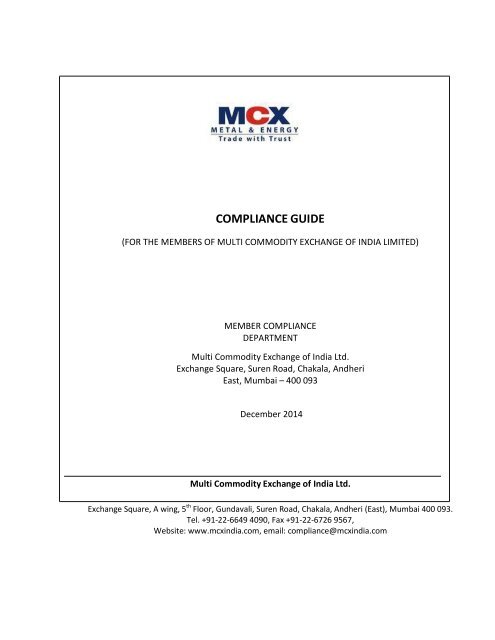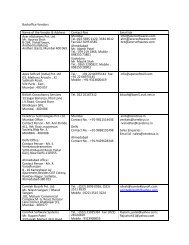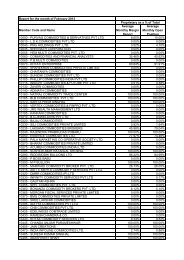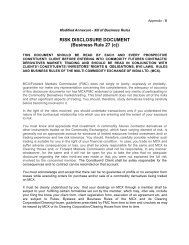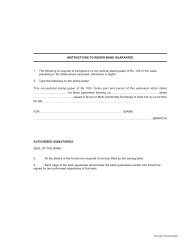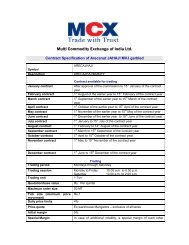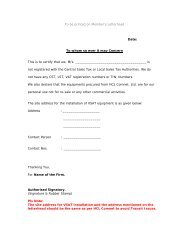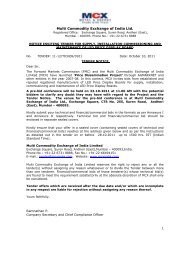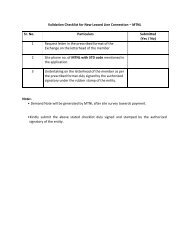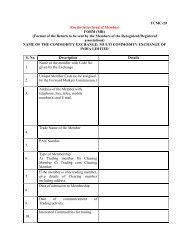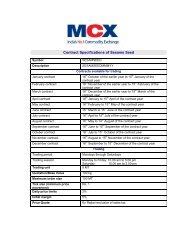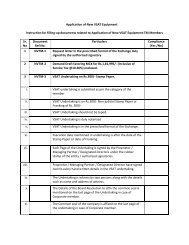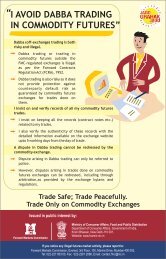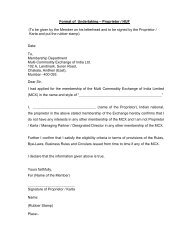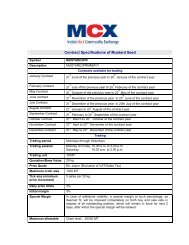compliance guide - MCX
compliance guide - MCX
compliance guide - MCX
You also want an ePaper? Increase the reach of your titles
YUMPU automatically turns print PDFs into web optimized ePapers that Google loves.
Compliance Guide5 Client Account Closure 23Chapter IVClientele Transactions1 Creation and allotment of Unique Client Code (UCC) 241.1 UCC Uploading to the Exchange 241.2 Allotting Single Client Code 242 Modification of Client Code 243 Brokerage 254 Portfolio Advisory and Management Services 265 Bank Accounts 276 Handling the Commodities of Clients for Deliveries 297 Margin Collection 298 Pre-Funded Instrument 319 Cash Dealings 3210 Issue of Statement of accounts/funds to Clients 3211 Inactive Clients 33Chapter VTrading System1 User Id and Approved Users 341.1. Approved users 341.2. User ID 342 Computer to Computer Link (CTCL) 342.1 Development of CTCL software 342.2. Some of the <strong>guide</strong>lines/requirements for use of CTCL terminals 353 Internet Based Trading (IBT) 354 Automated Trading Facility 355 Terminal Location 376 Antivirus Software 376.1 Regular backup of important data on the systems. 387 Pro-Account Trading Terminals 387.1 No. of Terminals 387.2 Approval from Exchange 398 System Audit of Algorithmic Trading Facility 39Chapter VIContract Notes1 Requirements on Issue of Contract Notes to Clients 40Chapter VIIMiscellaneous1 Trading Activity 42- 5 -
Compliance GuideEvery Member of the Exchange is required to take prior approval of the Exchange or willpromptly notify the Exchange in writing (as the case may be) about any change in theinformation provided by the Member of the Exchange at the time of admission or at a laterstage to the Exchange as per relevant Circulars, Rules, Bye Laws and Business Rules. Suchchanges include:‣ Change in constitution‣ Change in trade name‣ Change in share holding pattern / sharing pattern‣ Change in Dominant Promoter Group‣ Change in Directors/ Managing Partners‣ Change in address (both registered and correspondence)‣ Change in contact details‣ Change in Compliance Officer / Principal OfficerDocuments required to be submitted for the aforesaid changes are available on website at linkwww. mcxindia.com /membershipMembers are required to obtain prior written permission of the Exchange for any change inshareholding /sharing pattern / Dominant Promoter Group (DPG) except when such change inshareholding / sharing pattern (Refer Rule 26(b) and Circular No. <strong>MCX</strong>/MEM/132/2008 datedApril 15, 2008):‣ Does not alter the shareholding /sharing of DPG constituents in percentage terms‣ Does not lead to addition or deletion of a DPG constituent‣ Does not result in change in management/ control- 8 -
Compliance Guide2. Appointment of Authorized Person(Bye Laws 2.3.5, Business Rules 10A Refer circular no. <strong>MCX</strong>/MEM/282/2010 dated August 07,2010, Circular No. <strong>MCX</strong>/MEM/290/2010 dated August 16, 2010; Circular No.<strong>MCX</strong>/MEM/428/2010 dated December 01, 2010; Circular No. <strong>MCX</strong>/MEM/002/2011 datedJanuary 03, 2011; Circular No. <strong>MCX</strong>/COMP/113/2010 dated April 05, 2010; Circular No.<strong>MCX</strong>/MEM/317/2010 dated September 07, 2010; Circular no. <strong>MCX</strong>/MEM/047/2011 datedFebruary 23, 2011; Circular No. <strong>MCX</strong>/ MEM/044/2012 dated February 02, 2012 and Circular No.<strong>MCX</strong>/MEM/230/2012 dated June 25, 2012)An Authorized Person means and includes any person whether being an individual, (includingproprietors), a partnership firm as defined under the Indian Partnership Act, 1932, a LimitedLiability Partnership (LLP) or a body corporate as defined under the Companies Act, 1956 or aco-operative society as defined under the co-operative societies Act, 1912/Multi state cooperativesocieties Act, 2002 / any other respective/UT co-operative Act (including federationsof such co-operative societies) – who is appointed as such by a Member of a recognizedCommodity Derivative Exchange upon the approval of such Commodity Exchange, for providingaccess to the trading platform of a Commodity Derivative Exchange, an agent of the Member ofthe Commodity Derivatives Exchange.2.1 Eligibility for Authorized PersonAn Individual (including Proprietors), Partnership Firm as defined under the Indian PartnershipAct, 1932, a Limited Liability Partnership (LLP), body corporate under the Companies Act 1956 ora co-operative society as defined under the co-operative societies Act, 1912 is eligible to be anAuthorized person of the Exchange subject to fulfilling below mentioned criteria:‣ For an Individual:o Is a citizen of Indiao Is not less than 18 years of ageo Has not been convicted of any offence involving fraud or dishonestyo Has not been suspended or barred by any Stock or Commodity Exchange for aperiod of more than six continuous calendar monthso Has a good reputation and character- 9 -
Compliance Guideo Has passed at least 10th standard or equivalent examination from anInstitution recognized by the Central Government/State Governmento Possesses such certification that may be required by the CommodityDerivatives Exchange, as approved by the Commission from time to time‣ For a Partnership Firm/LLP/Body Corporate:All partners or directors, as the case may be, comply with the requirements as contained above.The object clause of the Partnership Deed or Memorandum of Association contain a clausepermitting the person to deal in commodities derivative contracts.‣ For co-operative society:If all the Members / Directors by whatever name called, of the Managing Committee /GoverningBody comply with the requirements contained above. However, in respect of clause above, theExchange may at their discretion relax the criteria of educational qualificationsIf the object clause of the Memorandum of Association of the co-operative society contain aclause permitting the co-operative society to deal in commodities derivative contracts.2.2 The Member’s Obligations with respect to Authorised Person:The Member is required to enter into an agreement prescribed by the Exchange with each ofsuch Authorised Persons after receipt of communication of acceptance of such AuthorisedPerson by the Exchange.The Member will permit the Authorised Person to admit or introduce clients and accept ordersfrom the clients on their behalf only after execution of the agreement as stated above.Members are responsible for all acts of omission and commission of his Authorized Person and/or their employees, including liabilities arising therefrom.If any trading terminal is provided by the Member to an ‘Authorized Person’ the place wheresuch trading terminal is located will be treated as branch office of the Member.- 10 -
Compliance GuideThe Member will display at each such branch office, additional information such as particulars ofAuthorised Person, in - charge of that branch, terms and conditions of his appointment, timelines for dealing through Authorised Person etc. as may be specified by the Exchange. Further,as per Circular No. <strong>MCX</strong>/ 295/2006 dated July 26, 2006; information/notice board is alsorequired to be displayed at the office of Authorised Person. Members are required to notifychanges, if any, in the Authorized Person to all registered clients of that branch at least thirtydays before the change.In case of any change in partners/ directors, change in shareholding/sharing pattern of theAuthorized Person, Members are required to intimate the Exchange of the details of theproposed change at least 30 days in advance in the format prescribed by the Exchange.In case of any change in status and /or constitution of the Authorized Person, Members arerequired to intimate the Exchange of the details of proposed change and submit all thedocuments of the proposed change at least 30 days in advance in the format prescribed by theExchange. Members are required to conduct periodic inspection of branches assigned toAuthorizedPersons and records of the operations carried out by them. The copies of such inspectionreports will be retained by the Member as a record for inspection of the Exchange and/or FMC,if required. It is the responsibility of the Member to audit the records of its AuthorizedPerson to ensure that they comply with the Rules, Bye laws, Business Rules and Circulars of theExchange issued from time to time.The clients dealing through an Authorised Person are required to be registered with theMember only. The funds, monies, commodities, warehouse receipts etc. of the clients will besettled directly between the Member and client. No fund/commodities of clients will bedeposited / transferred / credited into any account of Authorized Person. All documents likecontract note, statement of funds and commodities would be issued to client by the Member.Authorized Person will only provide administrative assistance in procurement of documentsand settlement, but are not allowed to issue any document to client in its own name.On noticing irregularities, if any, in the operations of Authorized Person, the Member willforthwith seek withdrawal of approval, withhold all moneys due to Authorized Person tillresolution of client grievances, alert clients in the location where Authorized Person operates,file a complaint with the police, and take all measures required to protect the interest of clientsand market. Members are required to ensure that no orders are executed by AuthorizedPerson before all documents as prescribed by the Exchange/Commission as the case may be,including obtaining of all KYC related documents for each client registered through suchAuthorised Person. Uploading of details pertaining to the Unique Client Code (UCC) is theresponsibility of the Member and the Authorized Person cannot create/allot such UCC to anyclient. All documents as mentioned above should be made available with the Member for theaudit / inspection or as and when required by Exchange or the Commission.- 11 -
Compliance Guide2.3 Trading Terminal to Authorized PersonIf any trading terminal is provided by the Member to the Authorized Person, the place wheresuch trading terminal is located will be treated as a branch office of the MemberIn addition to display of the Information board at the branch offices, members are also requiredto display information regarding particulars of the Authorized Person in charge of that branch,terms and conditions of his appointment, time lines for dealing through Authorized person, etc.,as may be specified by the Exchange,2.4 The Members are informed that:The system of sub-brokers by whatever name called is discontinued w.e.f. from January 31,2011. Members are allowed to provide access to their clients either through themselves orthrough “Authorised Persons” from the said date.‣ The Authorised Persons appointed by the Member must be registered with the Exchange.‣ The Authorised Person(s) shall be assigned a Unique Code by the Exchange.‣ The Member should enter into an agreement prescribed by the Exchange with each of theAuthorised Persons after receipt of communication of acceptance of such Authorized Personby the Exchange.‣ The Member should conduct periodic inspection of the branches assigned to the AuthorisedPerson(s) and records of the operations carried out by them, as prescribed by the Exchange.‣ The audit of the Authorised Person(s) has been conducted based on the <strong>guide</strong>linesprescribed by the Exchange and FMC.2.5 Member Authorised Person Agreement:The Member shall comply with the following requirements:‣ The Agreement should be printed on a non-judicial stamp paper of appropriate valueand is dated.‣ The Agreement should be filled completely and properly.‣ Date of Agreement should be after date of stamping and within six months of stamping.‣ The Agreement should be signed by Authorised person, Member as well as witnesses.‣ All the pages of the Agreement should be signed.‣ Agreement should contain clauses prescribed by Exchange / FMC from time to time.Further agreement should not contain any clause related to adjustment ofdeposit/brokerage/commission/salary of the Authorised person against the debitbalances of the clients introduced by the Authorised Person.- 12 -
Compliance Guide‣ The Authorised Person is required to inform the Member of any proposed change indirectors, change in its status and constitution, change in shareholding/sharing patternalong with the details of the proposed changes at least 45 days in advance in the formatprescribed by the Exchange.2.6 Change in Authorised Person status:The Member is required to intimate the Exchange any change in status and / or constitution,including change in partners/ directors, change in shareholding / sharing pattern of theAuthorized Person along with the details of the proposed change at least 30 days in advance inthe format prescribed by the Exchange.2.7 Authorized Persons – Processing Fees:With effect from July 1, 2012, the Exchange chargesRs. 1000/- (plus applicable Service Tax) per application, as the processing fee towards theapplications received for Authorized Persons registration.Rs. 500/- (plus applicable Service Tax) per application, as the processing fee for cancellation ofpreviously registered Authorized Persons.Members are required to note that all applications received by the Exchange on or after saiddate must be accompanied by the processing fees. Further, it may also be noted that theaforesaid charges are applicable as revised by the Exchange from time to time.It is further stated that the processing fee is not refundable in case of withdrawal of applicationsby the Member at any stage.Please refer www.mcxindia.com/Membership/AuthorisedPersons for details.- 13 -
Compliance GuideCHAPTER IIBooks of Accounts and Other Records1 Maintenance of Books of Accounts/Documents/ RecordsAll Members of the Exchange as well as other market intermediaries are required to maintainsuch Books of Accounts, Registers, Statements and other Records, in physical form orelectronically, as may be specified by the Relevant Authority and will be kept in good order andpreserved at least for such period as may be specified.The Members are required to maintain following Books of Account / Records / Registers /details, as per Bye-law 4.8, 11.5, Business Rules 21 (d), Rules 38 (f), and Circular No.<strong>MCX</strong>/12/2006 dated January 10, 2006, Circular No. <strong>MCX</strong>/COMP/195/2008 dated June 06, 2008,Circular No. <strong>MCX</strong>/COMP/399/2009 dated September 02, 2009, Circular No.<strong>MCX</strong>/COMP/113/2010 dated April 05, 2010 and Circular No. <strong>MCX</strong>/COMP/358/2011 datedOctober 11, 2011:‣ Order log / Order Book‣ Trade log‣ Trade File‣ Register of Transactions (Sauda Book)‣ Complaint / grievance register‣ Margin Deposit Book / Register of Margin Deposit‣ General Ledger‣ Exchange wise separate client ledger‣ Clients Bills along with bill summary‣ Commodity register/ledger‣ Records in respect of premium/discount‣ Records in respect of brokerage‣ Journals (JVs)‣ Cash Book‣ Bank Book‣ Bank Pass Book/Bank Statements- 14 -
Compliance Guide‣ Bank Reconciliation statements upto date‣ Daily Margin Statement and Client wise Margin reports‣ Records of transaction of all purchases and sales of commodities / contracts‣ Record of all statement received from the appropriate agencies and record of allcorrespondence with them‣ Copies of all instructions obtained in writing from constituents including participants fororder placement, order modification, order cancellation, trade cancellation.(up to June 05,2008) thereafter evidence of client placing / modifying / cancelling orders in any form,which may include written or electronic or voice recording instrument, since September2009‣ Record of contract-wise Deliveries received / tendered.‣ Duplicate copy of Contract Notes issued to clients‣ Proof of dispatch of contract notes to the clients‣ Proof of receipt / delivery of Contract Notes by clients‣ Evidences of making payment to the clients on account of Mark-To-Market gains by theclients‣ Separate Books for each branch / Authorized Person‣ Any other books of accounts/documents/records as prescribed by the FMC, Exchange and /or any relevant authority from time to timeThe above records/details are required to be preserved for a minimum period of three yearsexcept Trade log which is to be preserved for a minimum period of seven years unless explicitlyprovided for. However, records of transactions are required to be preserved for a minimumperiod of ten years as per PMLA <strong>guide</strong>lines. Records with respect to orders placed by the clientsare required to be maintained for at least 2 years and in disputed cases till six months from thefinal disposal of the dispute.It may be noted that a Member of the Exchange who is also a member on the NationalCommodity Spot Exchanges, is required to ensure that separate ledgers are maintained forbusiness done by clients on Commodity Futures Exchanges and National Commodity SpotExchanges.In case of Corporate Member, the Member should ensure maintenance of the Statutory Registeras required to be maintained under the Companies Act, 1956:‣ Register of Members‣ Register of Directors- 15 -
Compliance Guide‣ Register of loans‣ Register of Investment.‣ Register of Charges.‣ Register of Director’s Shareholding‣ Minutes of Board / Committee meetings, etc.2 Records in Soft Forms/ SystemsWith computerization of Members' back office operations, some of these accounts and recordsmay be maintained by the Members in their Systems. Hence, the members are required toensure the reliability of such system and provide the access of such systems to theExchange/FMC officials and/ or inspection team appointed by them if so demanded. Further themember should ensure to take and maintain the back up of the records from time to time andalso the backoffice software should be protected against any unauthorized access or threat byinstalling anti-virus software.2.1 Register of TransactionsAll Members are required to maintain a register of transaction, which contains details of alltrades transacted by them. This is a basic record, which each Member is required to maintainregularly on day-to-day basis. It contains the details regarding the name of commodity, name ofthe client on whose behalf the deals have been done, rate and quantity of commodity bought orsold. These details are maintained date-wise and include transactions related to both –‣ Member’s own business on the Exchange‣ Member’s business on the Exchange on behalf of clientsThe member should ensure that all the transactions are recorded in the said register.2.2 Client LedgerAs per Circular No. <strong>MCX</strong>/357/2006 dated September 02, 2006, every Member of the Exchange isrequired to segregate and maintain Exchange-wise client ledger.This ledger contains the details of the bills raised by the Member on the clients and the paymentreceived from or made to them for trade executed and /or any other charges debited byMember to clients. The Member must ensure that there has been no delay in making paymentof funds / delivering commodities to the clients.If the Member happens to have membership of more than one Exchange in the commodityderivatives market then the Member must ensure that receipts and payments from one accountand debits from another, solely for the purpose of convenience should not be done.- 16 -
Compliance GuideMembers must ensure that no adjustment of funds is made between commodities market andequities segment membership held under sister/associate concerns.Members are required to ensure that separate ledgers are maintained for business done byClients’ on Commodities Futures Exchange and National Commodity SpotExchange.2.3 Bank BookAll Members are required to maintain bank book for different bank accounts including ownaccount, client account, settlement account as opened by the Member. It is mandatory for themember to prepare the Bank reconciliation statement.2.4 Cash BookAll Members are required to maintain cash book. Member’s attention is also drawn towardscircular no. <strong>MCX</strong>/COMP/401/2009 dated October 01, 2009, wherein it is stated that membersshould not accept cash from the clients whether against obligation or as margin money fortrading in commodity derivatives.2.5 Margin Deposit BookThe Members are required to maintain a margin deposit book wherein details of all the marginscollected from the clients are recorded. Margin Deposits received by Members from their clientsin any form are required to be accounted for and maintained separately in segregated accountsand should be used solely for the benefit of the respective clients’ positions.2.6 Trade Log and Order LogMembers are required to download and save, on a daily basis, the files containing details of theorders placed and the trades executed by them during the entire trading session of the day,available at their Trading Work Stations (TWS) through File Transfer Protocol (FTP) at the end ofthe trading session.2.7 Order BookMaintenance of order log as mentioned above will be construed as maintenance of order book.2.8 Trade FilesTrade file is downloaded by the Member from the Exchange on daily basis. This file shows thedetails of all the transactions executed by a Member across all his terminals for a particulartrading day. It shows Trade date, trade no., order no., time of execution of a trade, quantity,rate, commodity code, Client ID etc.- 17 -
Compliance GuideLog of Trades/client code modification:All the trade/client code modifications should be reported to Exchange. Further members arerequired to maintain the records of such trade/client code modifications done at the Exchangeplatform. It may be noted that any trade/client code modification should be done only forgenuine punching error and not for any non genuine purpose. Members may refer to theChapter IV, point 2 of this <strong>compliance</strong> <strong>guide</strong> for further details.2.9 Register of CommodityA Member is also required to maintain a Register of Commodities where delivery taken/receivedCommodity wise and client wise is maintained.The Member shall mandatorily comply with the Exchange requirement of maintaining a Registerof Commodities in the event of delivery being given / taken. The details of deliverytaken/received must be reflected as Commodity-wise and Client-wise in the Register asfurnished below:Register of CommodityCommodityContractSymbolDateofreceiptfromtheExchangeDate ofdeliverytoClientToWhomdeliveredPurposeQuantityreceivedfromtheExchangeinlotsQuantityreceivedfromtheExchangein KgQuantitydeliveredtotheClient inlotQuantitydelivered totheClientin KgBalanceQuantityPriceatwhichthecommodityreceivedWhetherreceivedatPremium/Discount/ or onpriceAmountofPremium orDiscountRemarks2.10 Register of ComplaintsMembers should maintain a register of complaint where the Member should keep a record of allwritten complaints received from clients, showing the name and UCC of the client, date andparticulars of the complaint, action taken by the Member and whether the matter is referred to- 18 -
Compliance Guidearbitration of the Exchange, the particulars thereof must be mentioned as per Bye-laws, Rules,Regulations, Circular No. <strong>MCX</strong>/COMP/304/2007 dated September 01, 2007 of the Exchange.The Member shall maintain a Register of Complaints and also ensure that no complaintin the register is pending for more than such number of days as specified by the Byelaws,Rules, Regulations, Circular No. <strong>MCX</strong>/012/2006 dated January 12, 2006.- 19 -
Compliance GuideCHAPTER IIIAgreements, Documents, Authorizations, etc.1. Member-Client AgreementThe said requirement of Execution of Member Constituent Agreement is Omitted Vide circularNo. <strong>MCX</strong> /COMP/469/2011 dated December 22, 2011.2. Common/uniform client registration form/process (w.e.f. April 1, 2012):Requirements regarding Opening of Client AccountsAs per the format prescribed under Circular No. <strong>MCX</strong>/COMP/469/2011 dated December 22,2011 on common/uniform client registration form/process, the client will be required to fill inonly one set of documents applicable to all commodity Exchanges with effect from April 1, 2012.The member shall make available a folder/booklet containing following documents required forregistration of a client and ensure that a copy of the whole set is provided by them to theclients.a. List of mandatory documents:‣ Know Your Client application form captures the basic information about the constituent.‣ Uniform Risk Disclosure Document detailing risks associated with dealing in thecommodities market.‣ Rights & Obligations of Members, Authorised persons & Clients for trading on Exchanges(including additional rights & obligations in case of internet/Wireless technology basedtrading).‣ Do’s and Don’ts for the Clients.b. Tariff sheet specifying various charges including the rate/amount of brokerage fortrading on the Commodity Exchange(s).c. Contact details of senior officials and Investor Grievance cell.The non-mandatory documents may also be obtained from clients subject to followingconditions:-‣ The clauses should not be in contravention of any clauses in mandatory documents andRules, Business Rules and Bye laws of the Exchange.‣ Any authorization sought has to be a separate document and shall require specific consentof the client.- 20 -
Compliance Guide‣ Authorization sought shall always be subject to following conditions:- The client may revoke the authorization at any time. Authorisation should be in writing and signed by client only. Authorisation should not be obtained for Inter family/group company related accountsadjustment and not for any adjustment of funds among securities exchange andcommodity exchange.3. Know Your Client (KYC) Forms / Client Registration FormsThe Members of the Commodity Exchanges have to complete all the details pertaining to theclients in Know Your Client Forms and obtain all necessary documents in support to informationprovided by the clients as prescribed in Business Rule 27(b), Annexure XII of Business Rules /Circular No. <strong>MCX</strong>/COMP/469/2011 dated December 22, 2011. Member must ensure that allfields are filled in by the clients in the KYC forms.3.1 Format of KYC FormWhen establishing a relationship with a new Client, Members of the Exchange must takereasonable steps to assess the background, genuineness, beneficial identity, financial soundnessof such person, and his trading objectives by registering the client with them in the formatprescribed as Client Registration Form in terms of Business Rule 27(b), Annexure XII of BusinessRules/ Circular No. <strong>MCX</strong>/COMP/469/2011 dated December 22, 2011.The KYC form should include all the details as prescribed by the Exchange from time to time.Members are advised to evolve and put in place an appropriate mechanism to assessfinancial strength, performance tracking, trading pattern vis-à-vis their clients’ positionand dealings in respect of all clients.3.2 Documents required from client(s) along with KYC form (Refer Circular No.<strong>MCX</strong>/COMP/469/2011 dated December 22, 2011<strong>MCX</strong>/COMP/286/2013 datedAugust 28, 2013 and <strong>MCX</strong>/COMP/162/2014 dated April 30, 2014)The KYC form shall have all the documents (including copy of PAN card) as prescribed by theExchange / FMC in this regard from time to time. Further, in the cases of Non Resident Indians /foreign nationals / foreign entities / foreign shareholders trading in the commodity derivativesmarket; self-certified copies of statutory approvals in <strong>compliance</strong> with FEMA <strong>guide</strong>lines and byregulatory authorities like FIPB, RBI etc. are required to be available with the Member.However, Members may exempt prospective individual clients, residing in the state of Sikkimfrom PAN requirements. But the Members need to ensure that a system of proper verificationexists to verify that such clients are residents of the state of Sikkim.- 21 -
Compliance GuideThe Member is hereby informed about the following requirements with respect to KYC Forms:‣ Client registration documents are to be executed with any new client before commencingtransactions with the client.‣ The KYC should be as per format prescribed by the Exchange / FMC. KYC should becompletely filled and signed by client (For example: details such as net worth, details ofintroducer etc.)1. Photograph should be pasted on the KYC forms2. Photograph should be cross signed‣ It must be ensured that all the documents as mentioned above should be attached alongwith KYC forms and should be self-attested by the Clients.‣ All the documents must be verified against the original by the Member.‣ Trades must not be executed before an account is opened.‣ Provide copy of set of all KYC documents to client. Electronic Contract note declaration is tobe obtained by the Member from the clients who opts to receive the ContractNote in Electronic Form in place of physical Contract Note. Further, theMember may note that this declaration will remain valid till it is revoked bythe client as per the circular no. <strong>MCX</strong>/COMP/087/2014 dated March 19, 2014 issued in thisregard. Further list of valid documents with respect to above is mentioned in the CircularNo. <strong>MCX</strong>/COMP/469/2011 dated December 22, 2011,and <strong>MCX</strong>/COMP/286/2013 datedAugust 28, 20133.3 Risk Disclosure Document (RDD) and Investors’ Rights and Obligations (IR&O) (ReferBye Laws 14.1.1, 14.1.2):The Exchange has specified the format of RDD in Business Rule 27 (c), Annexure-XIII, andsubsequently modified by the Exchange vide Circular No. <strong>MCX</strong>/COMP/469/2011 datedDecember 22, 2011 through which the Clients are made aware of the risks associatedwith business in trading in contracts listed on the Exchange including any limitations on thatliability and the capacity in the Member’s acts and the Client’s liability thereon. Further the IR&Ohas been introduced through Appendix 3 of the aforementioned circular which is required to beread in conjunction with the RDD.Further, vide Circular no. <strong>MCX</strong>/COMP/116/2014 dated April 01, 2014 the format of RDD has beenmodified which is applicable to all the clients with effect from May 01, 2014. The Members arerequired to obtain the said set of revised documents from all their existing clients’ latest byDecember 31, 2014 and further maintain sufficient proof of delivery of such document issued.The Member shall furnish a copy of these documents to all his clients and further ensure thatthe same is issued in the format as prescribed by the Exchange.- 22 -
Compliance Guide4. List of Do’s and Don’ts.As a part of KYC documents, it is mandatory to give list of Do’s and Don’ts to the clients asprescribed by the Exchange/ FMC.5. Client Account ClosureIn the event of any account being closed by the Member, the member must ensure that priorwritten confirmation of the account closure request had been received from the Client and suchwritten request has been maintained by the Member in his records.In the event that the account is closed by the Member, the Member shall maintain documentaryproof / evidence of the same and mark the client inactive in UCC database of the Exchange.- 23 -
Compliance GuideCHAPTER IVClientele Transaction1. Creation and allotment of Unique Client Code (UCC)1.1 UCC Uploading to the ExchangeThe Member shall upload UCC details before execution of the trade whenever a new client isregistered as per Circular No. <strong>MCX</strong>/T&S/085 dated March 05, 2007, Circular No.<strong>MCX</strong>/T&S/109/2007 dated March 24, 2007, Circular No. <strong>MCX</strong>/T&S/405/2008 dated December20, 2008 and <strong>MCX</strong>/T&S/355/2011 dated October 10, 2011. Further, as per Circular no.<strong>MCX</strong>/T&S/050/2013 dated February 13, 2013 and Circular No. <strong>MCX</strong>/T&S/093/2013 dated March07, 2013, all the members are required to upload the mobile number and / or email address ofthe new clients while updating the UCC database and registering new clients. It may be notedthat uploading the mobile number is a mandatory field in the UCC application. Hence, themembers are directed not to place orders of the clients whose mobile number is not uploadedin the UCC database of the Exchange. However, as per circular no. <strong>MCX</strong>/T&S/224/2013 datedJune 25, 2013 registration of email id of the clients is not a mandatory requirement forexecution of trade. Hence, the members should not prevent their clients from trading in casethey have not submitted their email address to the member / Exchange.The penalty applicable for non-submission of UCC details will be charged on a daily basis. Thedetails uploaded in UCC with Exchange must be up to date with respect to address/PANdetails/Contact details.1.2 Allotting Single Client CodeAs per Bye-law 5.21, Circular No. <strong>MCX</strong>/COMP/088/2008 dated March 04, 2008, Circular No.<strong>MCX</strong>/COMP/317/2008 dated October 07, 2008, Circular No. <strong>MCX</strong>/COMP/113/2010 dated April05, 2010, and Circular No. <strong>MCX</strong>/ T&S/ 074/2011 dated March 12, 2011 Members are notpermitted to allot multiple client code to the single client. All additional client codes to a singleclient (inactive client) are to be deactivated / frozen immediately and should not be used fortrading.2. Modification of Client CodeA special facility is provided to Members for client code modification by the Exchange in case ofgenuine punching error of the dealer while entering the client codes. The same is presented asbelow:‣ Member can change client ID of executed trades only in the post-closing session of thatcommodity as per Business Rules 27(v), Circular No. <strong>MCX</strong>/T&S/166/2007 dated April 30,2007 and Circular no. <strong>MCX</strong>/T&S/343/2011 dated September 30, 2011 and- 24 -
Compliance GuideA trading member shall not share brokerage with:-‣ Another Member‣ An employee of another member or a person for or with whom members are forbiddento do business‣ Persons who are not approved users/Authorized PersonsFurther, please note that the member has to provide Tariff Sheet (along with Set of AccountOpening Document) to their clients while opening their account, which is a document detailingthe rate/amount of brokerage and other charges levied on the client for trading on theCommodity Exchange(s).4. Portfolio Advisory and Management ServicesThe Member should not indulge in any Portfolio Advisory Services (PAS), PortfolioManagement Services (PMS) and such other services directly or indirectly (i.e. any act of theMember which may be considered as PMS/PAS etc. though not clearly indicated by theMember) as per Rules 38 (f), Circular No. <strong>MCX</strong>/COMP/259/2013 dated July 26, 2013,<strong>MCX</strong>/COMP/261/2010 dated July 26, 2010, Circular No. <strong>MCX</strong>/COMP/399/2008 dated December18, 2008, Circular No. <strong>MCX</strong>/561/2006 dated December 15, 2006 and Circular No.<strong>MCX</strong>/551/2006 dated December 13, 2006. Further, as per Circular no. <strong>MCX</strong>/COMP/332/2013dated October 4, 2013 and <strong>MCX</strong>/COMP/349/2013 dated October 15, 2013, Members must alsonot indulge themselves in the following activities which are not allowed in the CommodityDerivatives Segment:a) any activity in the nature of promise of assured returns after a certain fixed time period(for example a month, 3 months or 6 months etc.) or assured profits by themember or profit sharing activityb) any activity without executing Member Client Agreement or completing Uniform ClientRegistration formalities with the clientc) any activity without presenting client with a Risk Disclosure Documentd) any activity without proper orders from the client for managing his accounts /executing trade etc.e) any advertisement / publicity made by the Member highlighting only the benefits of futuresmarket without highlighting the risk involved- 26 -
Compliance Guidef) any other activity which is ambiguous or misleading the client in any way.Further, the Members may note that if they are found indulged in any of the above activities,the Exchange shall take strict disciplinary action such as deactivation of terminal (s), suspension/ termination from Membership and in addition, the Member shall also be liable for a penalty ofminimum Rs.1 lakh per case in terms of the Rules, Bye Laws, Business Rules and Circulars of theExchange.5. Bank AccountsAll Members are required to open following three types of bank accounts.‣ Settlement bank accountAs per Bye-law 9.2, Business Rule 19 (c), every Member of the Exchange is required to havedesignated bank account (called settlement bank account) with any of such branches of adesignated Clearing Bank, which has electronic funds transfer facility. Members are required tooperate the Settlement account only for the purpose of settlement of deals entered through theExchange, for the payment of margin money and for any other purpose as may be specified bythe Exchange, where the Member can transfer funds to Clients account from this account. Apartfrom such transfer, only the Exchange will have the power to withdraw money from this accountby way of direct debit instruction.‣ Client bank accountAs per Bye-law 9.2, Business Rule 19 (c), the Member can deposit cheques received from theClient and he should issue cheque/DD from this account to his Clients towards their receivableamount in the Client bank account. The Member will have a cheque book facility in this accountand he will also be entitled to issue transfer instructions to the bank for transferring moneyfrom this account to the Settlement account to meet his pay-in or margin obligations. Membersare not allowed to use Client funds for their own transactions or for transactions of any otherclient or for the purpose other than specified by the Exchange. (Refer Business Rule 27(q))‣ Business/Own/Expense accountAs per Bye-law 9.2, Circular No. <strong>MCX</strong>/012/2006 dated January 10, 2006 all Members arerequired to ensure that they have maintained separate bank accounts for their owntransactions.As per Circular No. <strong>MCX</strong>/012/2006 dated January 10, 2006the Exchange Member will at all timeskeep the money of the Constituent in the Clients account maintained with the Clearing bank.Client funds should not be deposited in own bank account.The member must ensure <strong>compliance</strong> with the following requirements:‣ As per Business Rule 27(q), every Member shall maintain the Constituent/client funds in the- 27 -
Compliance Guide6. Handling the Commodities of Clients for DeliveriesTypes of Demat Account:As per Circular No. <strong>MCX</strong>/238/2005 dated June 29, 2005 and Circular No. <strong>MCX</strong>/267/2005 datedJuly 22, 2005 all Members are required to open two accounts with their Depository Participantsfor handling the receipt and deliveries of commodities in demat form. They are:‣ Beneficiary Owner (BO) Account:It is opened by an investor or a Member of the Exchange who wants to hold and transactcommodities through dematerialized warehouse receipts. The beneficial owner account can beopened in the name of Individual, Corporate, and Registered Trusts etc.‣ Pool account:It is popularly known as CM Pool Account. In CM Pool account clearing Members are authorisedto make pay-in and receive pay-out from a Clearing Corporation / Clearing House against tradesdone by them or their clients. This account is meant only to transfer commodities to and receivedelivery of commodities from the clearing corporation/clearing house and hence, the Memberdoes not have any ownership (beneficiary) rights over the commodities held in such an account.A Clearing Member (CM) is required to open both Clearing Member (Pool) Account as well as aBO Account with each of the depositories (i.e. NSDL and CDSL).Members are required to maintain a proper record of all commodities received and deliveredfrom their Pool Account and transferred to BO, if any. Further Member should preserveacknowledged copies of the Delivery Instruction Slip (DIS) given/to their DP for transferring thecommodities from the Pool Account to the clients’ account after Pay-out from the Exchange.The Member must keep and maintain the Register of Commodities and details of premium anddiscount, in case of delivery. Further member may refer to circular no. <strong>MCX</strong>/405/2005 datedDecember 3, 2005 and <strong>MCX</strong>/309/2005 dated September 2, 2005.It may be noted that as per Circular No. <strong>MCX</strong>/C&S/283/2013 dated August 22, 2013, delivery inall commodities on Exchange platform expiring from August 2013 contract onwards shall besettled only by Physical Mode viz. by submitting valid vault receipts/ warehouse receipts (dulyendorsed and signed by the depositor and the member) and quality certificate issued bydesignated quality certifying agency.7. Margin CollectionsAs per Bye-law 8, Business Rule 27(r), the Members are required to collect specified marginfrom their clients before entertaining any order from them Members may note that 100%upfront initial margin must be collected by them from their clients before placing any order ontheir behalf. The member must ensure that the margin has been collected in the formprescribed by the Exchange and that the same has not been used for another client. Further, the- 29 -
Compliance Guidemargin collected from the Clients should be highly liquid in nature and in the beneficialownership of the depositing Client. Thus, it may be noted that the member is required to acceptonly such collaterals from the clients which are in their own name or in respect of which theclient is the beneficial owner of pledged securities. In cases, where the client is not thebeneficial owner of the pledged securities offered as collaterals, the Member should not utilizesuch securities for meeting the obligations of the client without obtaining a written consent forthe same from the holder/owner of those pledged securities offered as collaterals. (ReferCircular No. <strong>MCX</strong>/Compl/429/2010 dated December 4, 2010 and <strong>MCX</strong>/C&S/214/2011 datedJune 09, 2011.)In case if the member is also the member on the National Commodity Spot Exchanges, theyshould ensure that they do not allow any cross margining between exposure of a client onCommodity Futures Exchanges and National Commodity Spot Exchanges. (Refer<strong>MCX</strong>/COMP/358/2011). Further if the member is also a member of the Securities Exchangesthrough Group Company, then its client’s margin requirement should not to be adjusted againstbalances of the same client in Securities Exchanges. Further if the client desires of adjusting hiscredit balances in other Commodities Derivative Exchanges then such credit balances should befree from any margin obligation in that Commodity Derivative Exchange.The Exchange provides Margin files to the Members at the end of each day. These files containdetails of the margin that is needed to be collected from the Client in respect of the Client’sopen position during that day. A sample format of the margin file is furnished below which maybe prescribed by the exchange:DateMemberIDUserIDClient/ ProClient /ProCodeRegularMarginAdditionalMarginTenderMarginDeliveryMarginBenefitTotalMarginRequiredThe Margin calculation must be made available in the form of ledger balance, securities, FixedDeposits etc., as may be prescribed by the Exchange.Accounting of Margin Deposit and maintaining margin deposit bookAs per bye-Law 8.6.10, Margin deposits received by Members from their Trading Members andclients in any form will be accounted for and maintained separately in segregated accounts andwill be used solely for the benefit of the respective clients’ positions. As per bye-Laws, Marginaccounts of clients of the Members will be marked to market daily by Trading-cum-ClearingMembers and further margin should be collected when necessary to maintain the appropriatemargin. Members are required to maintain one book/records of the entire margin collectedfrom its clients.- 30 -
Compliance GuideUtilization of Margin Amount and Margin CallThe margin account of Trading Members is required to be utilized by clearing Members only forsettling the dues to the clearing Member upon marking-to-market or for fulfilling the obligationsresulting from their open positions. As per Bye-law 8.6.5, the member may close out an openposition of a client when the call for further margin or any other payment due is not compliedwithby the client.As per Bye-law 8.6.10, Members are required to furnish their clients in writing such reports andat such intervals for margin collection and its utilization as may be specified by the RelevantAuthority.As per Bye law 8.6.1, no member will directly or indirectly enter into any arrangement or adoptany procedure for the purpose of evading or assisting in the evasion of the margin requirementsprescribed under the Bye-Laws, Rules and Regulations or any orders issued there under.Regular monitoring of short collection/ non-collection of Margin:As per Circular No. <strong>MCX</strong>/C&S/109/2014 dated March 29, 2014 it is mandatory for all theClearing/ Trading Members to report the details of margin collected from the clients to theExchange. It may be noted that the Exchange has laid down the procedure for reporting Clientlevel margin by the Members from the said clients as per Circular no. <strong>MCX</strong>/C&S/117/2014 datedApril 01, 2014. Further, the Members are required to monitor their clients’ trade and put up asuitable mechanism to:‣ Update their clients on their margin utilization levels‣ Define margin call triggersFurther, as per Circular no. <strong>MCX</strong>/C&S/383/2014 dated December 01, 2014, members areprovided with the facility of revision of the margin collections of clients reported to the Exchangein case of any errors due to technical reasons within the time as stipulated in the said Circular.Members must ensure that proper internal controls are in place so as to avoid repeatedinstances of technical errors in margin reporting.8. Pre Funded InstrumentsThe members are required to comply with the circular on Pre funded Instruments if theaggregate value of the pre funded instruments like demand draft / Pay order is Rs. 50,000 ormore per day per client. (Refer Circular No. <strong>MCX</strong>/COMP/348/2011 dated October 4, 2011).Further, the Members of the Exchange are notified that:If the aggregate value of the pre-funded instruments like Demand Draft/Pay Order is Rs 50,000(Fifty Thousand) or more per day per client, the Member may not accept the instrument unlessthe same is accompanied by the name of the bank account holder and the bank account number- 31 -
Compliance Guide11. Inactive ClientsA client is considered as Inactive Client if he / she have not executed any trade during the last 6months.As per Business Rules 27 (u), Circular <strong>MCX</strong>/COMP/513/2009 dated December 15, 2009 andCircular No. <strong>MCX</strong>/COMP/298/2010 dated August 21, 2010, members are required to follow thebelow mentioned <strong>guide</strong>lines with respect to inactive clients:‣ The Members should keep close watch on such accounts.‣ The Members should accept trades in these accounts only on completion of belowmentioned <strong>compliance</strong>s:An undertaking having specific written request from the clients to re-open their inactive tradingaccountIf there is no material change in KYC information (such as address, bank account, PAN no. etc.)provided by the client at the time of opening their account with the member then in such casesinstead of taking KYC formalities again, Member may take undertaking from the clientmentioning:‣ He (the client) has already completed KYC formalities at the time of original registration withthe memberThere is no material change in respect of the information contained in the said KYC.‣ After completion of above mentioned <strong>compliance</strong>s, the Member may execute the orders onbehalf of such clients in the same client code i.e. the client code issued earlier by themember to the concerned client.‣ If trade takes place in such inactive account without following the above procedure, thesame would be treated as members‘ proprietary trade for all practical purposes and also asmisuse of client‘s UCC- 33 -
Compliance Guide2.2 Some of the <strong>guide</strong>lines/requirements for use of CTCL terminalsFollowing are some of the requirements for the use of CTCL terminals as per Circular No.<strong>MCX</strong>/CTCL/043/2007 dated February 02, 2007 Circular No. <strong>MCX</strong>/CTCL/171/2008 dated May 15,2008 and Circular No. <strong>MCX</strong>/CTCL/120/2009 dated March 20, 2009:Members developing CTCL software in-house/procuring CTCL software from Non-empanelledvendors are required to pay prescribed charges to the Exchange from time to time.Members are required to provide list of approved persons who would handle each CTCLterminal of the Member. Approved person may be an employee or any Authorised Person of theMember who has been approved by the Exchange. Members will not entrust the CTCL terminalsto their clients or to any unregistered intermediary other than Approved Persons. Necessarywritten approval of the Exchange is required to be obtained before CTCL terminal is entrusted toan Authorised Person, failing which it will be treated as violation. (Refer Bye-law 6.1.7, BusinessRule 29(b), Business Rule 30, Business Rule 32,)A Member will also ensure to undertake periodic audit of their systems. (Refer Circular No.Circular No. <strong>MCX</strong>/CTCL/433/2010 dated December 10, 2010)3. Internet Based Trading (IBT) (for the Exchanges applicable):As per circular No. <strong>MCX</strong>/CTCL/152/2012 dated April 16, 2012; the Exchange has specified newapproval process for IBT and Wireless Trading. As per Circular No. <strong>MCX</strong>/28/2004 dated May 7,2004, the Members are advised to comply with <strong>guide</strong>lines such as Network Security, RiskManagement, Order matching etc.Further, the Exchange has come up with the Circular no. <strong>MCX</strong>/26/2004 dated April 29, 2004 andCircular No. <strong>MCX</strong>/CTCL/042/2007 dated January 31, 2007 for use of Internet based trading forexpanding Members’ Trading terminal.Further the Member has to install the necessary safeguards and access restrictions to preventunauthorised use of their computer systems and ensure that no unauthorised person can gainaccess to the computer systems.Members are mandatorily required to undertake periodic audit of their Computer to ComputerLink (CTCL) and Internet based Trading systems.4. Automated Trading FacilityThe term `Automated Trading Facility´ means any software or program facility by the use ofwhich, upon the fulfillment of certain specified parameters and without the necessity of manualentry of orders, buy/sell orders are automatically generated and entered by the software/program facility through CTCL software into the Trading System of <strong>MCX</strong>.Members may avail the Automated Trading Facility (ATF) through CTCL solutions subject tofollowing conditions:- 35 -
Compliance GuideMembers may install the ATF through CTCL software only at the locations of the members afterensuring that all the requirements stipulated by the <strong>MCX</strong> in this regard have been compliedwith. Members are required to obtain prior written permission of the Exchange for any changesin the software for the purpose of availing Automated Trading Facility through CTCL.All automated trading orders need to be placed through specified CTCL IDs allotted for thepurpose and all automated trading orders should be placed in the system through these IDsonly. System audit that is being done for CTCL is required to be extended to the automatedtrading software and the same may be carried out in conjunction with the CTCL audit.The Members are required to execute, sign, and subscribe, to documents, papers, agreements,covenants, bonds, and / or undertakings as may be prescribed or required by the Exchange fromtime to time. Members are required to ensure that the trades routed through AutomatedTrading facility do not result into abnormal trades or manipulative trades.Members are required to comply with the terms and conditions as agreed upon in theundertaking submitted by them for availing Automated Trading Facility.As per Circular No. <strong>MCX</strong>/CTCL/120/2009 dated March 10, 2009, Exchange may at any timeundertake inspection / audit of the Automated Trading system which is being used by them andmembers are required to co-operate with the Exchange for such inspection / audit.As per circular No. <strong>MCX</strong>/TECH/110/2011 dated April 1, 2011, Members shall be required to payannual fee for the first year in advance along with the application (The said charges are revisedvide circular No. <strong>MCX</strong>/TECH/149 dated April 28, 2011). The annual fee for the first year shall becalculated on pro-rata basis from the date of receipt of Member’s application till March 31st ofthe respective financial year. Any excess amount paid for the first year (on pro-rata basis) shallbe adjusted towards annual fees for the next financial year. The annual fee shall be payable onor before 30th April of every financial year. In case of delay in payment, Members shall also beliable to pay interest at the rate of 18% p.a. However, it may be noted that as per Circular no.<strong>MCX</strong>/CTCL/196/2013 dated May 28, 2013, the annual charges per ATF user ID payable by theMembers will be discontinued with retrospective effect from April 01, 2013.Members are requested to note that the Automated Trading Software approved by theExchange should be exclusively used for Trading on <strong>MCX</strong> Trading platform. Members who arealready using ATF are requested to submit the revised undertaking as per Annexure A latest byApril 30, 2011.Members who wish to apply for ATF through CTCL Software are required to submit the requireddocuments along with the applicable charges as per Circular no. <strong>MCX</strong>/TECH/110/2011 datedApril 1, 2011 mentioned above.As per circular No. <strong>MCX</strong>/CTCL/132/2012 dated April 4, 2012, Members using Automated TradingFacility through approved software of empanelled CTCL vendor or software developed in-houseor procured from non-empanelled vendor shall submit to the Exchange Compliance certificate- 36 -
Compliance Guideas mentioned in the annexure of the said circular. The said <strong>compliance</strong> certificate is to besubmitted latest by 30 th June on yearly basis.Members of the Exchange having Exchange approved Algorithmic Trading Facility (ATF) arerequired to undertake system audit of their ATF software on yearly basis through Exchangeempanelled System auditors as required as per Circular no. <strong>MCX</strong>/CTCL/191/2013 dated May 23,2013.Further, it may be noted that as per Circular no. <strong>MCX</strong>/T&S/402/2012 dated November 30, 2012algo / high frequency trades are not allowed in mini and micro contracts. However, as perCircular no. <strong>MCX</strong>/T&S/258/2013 dated July 24 2013 algo / high frequency trading is allowed ingold mini contracts. It may thus be noted that algo / high frequency trades shall be allowedas permitted by the Commission from time to time.5. Terminal LocationAs per Bye Law 5.15.1, Rule 36 (c),Business Rule 29(b , 30, Trading on the Exchange will beallowed only through approved Workstation(s) located at approved locations for the office(s) ofa Member. If an approved workstation of a Trading Member is connected by LAN or any otherway to other workstations at any place it will require an approval of the Exchange. For everyTWS, a member will be required to take specific permission from the Exchange and obtain userid in advance. Further, the Members must ensure <strong>compliance</strong> with the <strong>guide</strong>lines prescribed bythe Exchange with regard to installation of trading terminals at the Member offices.As per Circular No. <strong>MCX</strong>/CTCL/042/2007 dated January 31, 2007 , the member should submitan undertaking of not to develop or use any software / program which will either directly orindirectly facilitate orders to cross trades of their clients with each other. All orders will beoffered to the market for matching.6. Antivirus Software (Refer Circular No. <strong>MCX</strong>/028/2004 dated May 07, 2004)As per Circular No. <strong>MCX</strong>/028/2004 dated May 07, 2004, Members should ensure that:‣ Operating system (Windows) of their respective Desktop/Laptops used for Exchange tradingis updated with the latest security patches released by the operating system vendor(Microsoft). The members can ask their systems personnel or their hardware vendor toupdate the systems with the latest security patches.‣ Members should ensure that standard anti-virus software is loaded on their systems.‣ The members should use good anti-virus software for their systems.‣ Further, the antivirus software with the latest virus signatures has been updated periodicallyand the periodic updates for the antivirus are available on the respective anti-virus vendorwebsites.‣ Update the antivirus software with the latest virus signatures every week. Further, theyshould ensure that the weekly updates for the antivirus are available on the respective antivirusvendor websites and that the antivirus software for the Admin terminal is latest and is- 37 -
Compliance Guideupdated.6.1 Regular backup of important data on the systems (Refer Circular No. <strong>MCX</strong>/028/2004dated May 07, 2004)The Member must keep the backup periodically and maintain the register of the same. It mustbe ensured that Members do not download executable files from non-trusted sources on theInternet or from emails. Internet users should have desktop firewalls to protect theirsystems against unauthorised access from the Internet. Members planning to usepersonal/desktop firewalls are requested to contact Exchange systems personnel for thenecessary information required to allow Exchange Trader Workstation to communicate to theExchange.Members having corporate internet access like Internet Leased line, Cable Internet, ISDN or anyother type of Internet connectivity should use firewalls to protect their networks from maliciousand unauthorised access arising from the internet.Further as per Circular No. <strong>MCX</strong>/012/2006 dated January 10, 2006, the Member is required toensure that he has installed antivirus software which is capable to take care of operatingsystems and in case of members using internet for trading has installed firewalls to protect theirnetworks.7. Pro-Account Trading Terminals7.1 No. of TerminalsAs per Circular No. <strong>MCX</strong>/241/06 dated June 15, 2006, Members will place orders in ‘Pro-Account’ / OWN Account from not more than 2 terminals from one location and details of theterminals shall be informed to the Exchange in the format enclosed as Annexure 1 of the saidcircular.Trading terminals other than the above will have a facility to place orders only for and on behalfof a client by entering client code details as required / specified by the Exchange / FMC. Further,Member desirous to have facility of placing ‘Pro-Account’ / OWN Account orders from morethan one location, the Member has to submit an undertaking in the format, enclosed asAnnexure 2 of Circular no. <strong>MCX</strong>/241/06 dated June 15, 2006 to the Exchange stating the reasonfor use of such facility from multiple locations. The Exchange may on case to case basis considerextending the facility of allowing use of ‘Pro-Account‘ from more than one location; further,such permission will not be given for more than 5 terminals for a member across all locations forthis purpose.As per Circular No. <strong>MCX</strong>/347/2006 dated August 29, 2006 if any Member, undertaking proaccounttrading for arbitrage, desires to place pro-account trades through more than 2terminals in one location or more than 5 terminals across all locations, then he is required tosubmit a request to the Exchange stating the reasons for the same.As per Circular No. <strong>MCX</strong>/T&S/314/2011 dated September 14, 2011, while placing an order on- 38 -
Compliance Guidethe Exchange platform for purchase / sale of contracts in the trading system, Members arerequired to choose the Account type’ option as ‘Own’ while placing orders for proprietarytrades. Members are advised to strictly use ‘Own’ account facility for trades to be executed fortheir proprietary account. No client code including client code styled as OWN / PRO should beallotted for proprietary trading.Members are not allowed to modify proprietary trades into client trade and client trade intoproprietary trades.7.2 Approval from ExchangeThe Members having CTCL terminals are required to obtain approval from the Exchange for Pro-Account trade facility as per Bye-law 6.1.7, Circular No. <strong>MCX</strong>/241/06 dated June 15, 2006.8. System Audit of Algorithmic Trading Facility(Refer circular no. <strong>MCX</strong>/358/2006 dated September 02, 2006, <strong>MCX</strong>/CTCL/171/2008 dated May15, 2008, <strong>MCX</strong>/CTCL/120/2009 dated March 10, 2009, <strong>MCX</strong>/TECH/110/2011 dated April 01,2011, <strong>MCX</strong>/TECH/149/2011 dated April 28, 2011, <strong>MCX</strong>/CTCL/116/2013 dated March 22, 2013 and<strong>MCX</strong>/CTCL/191/2013 dated May 23, 2013)‣ Members must ensure that all the algo orders should be placed through specified CTCL idallotted and approved by the Exchange‣ Members are required to obtain the order level risk controls at the individual level as well asclient level like Daily Price Limit, Maximum Order Size, Position Limit, and Market PriceProtection etc.‣ Members of the Exchange having Exchange approved Algorithmic Trading Facility (ATF) arerequired to undertake system audit of their ATF software on yearly basis through Exchangeempanelled system auditors.- 39 -
Compliance GuideCHAPTER VIContract NotesThe Contract note is a document through which a contractual obligation is established betweena Member of the Exchange and its client. This is the prime document on the basis of which allthe dispute between the Member and his clients are settled.Every Member has to issue contract notes to his clients for the commodities traded by him onbehalf of them in <strong>compliance</strong> with the Rules, Bye-laws, Regulations, Business Rules and Circularsissued from time to time. (Refer Bye-law 4.7, Business Rule 27(p), Circular No. , <strong>MCX</strong>/012/2006dated January 10, 2006, Circulars No. <strong>MCX</strong>/409/2005 dated December 05, 2005, Circulars No.<strong>MCX</strong>/COMP/304/2007 dated September 01, Circular No. <strong>MCX</strong>/COMP/195/2008 dated June 06,2008, Circular No. <strong>MCX</strong>/LEGAL/363/2008 dated November 15, 2008, Circular No.<strong>MCX</strong>/COMP/046/2011 dated February 23, 2011 Circular No. <strong>MCX</strong>/COMP/256/2011 dated July20, 2011, Circular No. <strong>MCX</strong>/COMP/358/2011 dated October 11, 2011 Circular no.<strong>MCX</strong>/LEGAL/404/2011 dated November 3, 2011, Circular no. <strong>MCX</strong>/LEGAL/137/2012 datedApril9, 2012 and <strong>MCX</strong>/LEGAL/138/2012 dated April 9, 2012 and <strong>MCX</strong>/COMP/227/2013 datedJune 28, 2013).1. Requirements on Issue of Contract Notes to ClientsFollowing are the some of the requirements from Member of the Exchange to follow on issue ofContract notes to their clients:‣ Members of the Exchange are required to issue contract note for each of the transactionsdone by them for their respective clients on the trading system of the Exchange. Membersare not allowed to issue contract note for any transaction, which has not been executedthrough the trading system of the Exchange.‣ Contract notes should be issued strictly as per the format prescribed by the Exchange. (ReferCircular No. <strong>MCX</strong>/LEGAL/363/2008 dated November 15, 2008, <strong>MCX</strong>/LEGAL/404/2011 datedNovember 03, 2011, <strong>MCX</strong>/LEGAL/137/2012 dated April 9, 2012 and <strong>MCX</strong>/LEGAL/138/2012dated April 9, 2012 and <strong>MCX</strong>/COMP/227/2013 dated June 28, 2013)‣ The Members are required to issue contract notes to clients, which are serially numbered.The contract notes issued to the clients are required to be numbered with unique runningserial number commencing from one which will be reset only at the beginning of everyfinancial year. Contract notes should not be left blank.‣ Members are required to charge brokerage separately and they should ensure that the sameis indicated separately on the contract note.‣ The Contract notes are required to be signed either by the Member himself or by theauthorised signatory.‣ Members are required to dispatch and ensure that the same are delivered to their clientswithin 24 hours of execution of the trade.‣ The members are required to issue contract notes to their clients only in physical formunless the Client specifically indicates his preference for contract notes in electronic form.Accordingly, the member may also issue digitally signed contract note at the request of his- 40 -
Compliance Guideconstituents subject to the <strong>compliance</strong> of all the provision of Information Technology Act,2000. If the Member is issuing digital contract notes then it should be authenticated bydigital signatures from certifying authority as per Information Technology Act, 2000.‣ A s p e r C i r c u l a r n o . M C X / C O M P / 0 8 7 / 2 0 1 4 d a t e d M a r c h 1 9 ,2 0 1 4 , the Member should obtain ECN Declaration Form from the clients who wish toavail such facility and the said declaration shall be valid till it is revoked by the client.‣ The ECN declaration form should normally be in English. In case a Client is not conversantwith the English language, the Member has to provide the ECN form which should be bilinguali.e., in English and the local language known to the applicant.‣ The Client also has the option of revoking the ECN facility and opting for the contract note inthe physical form only by giving 7 working days’ notice to the Member. The copy of the same isrequired to be retained by the Client.‣ In case of ECN mail getting bounced at the Member’s mail box then member needs todeliver the contract notes in physical form to the respective client.‣ Member should keep necessary log reports if digital contract note have been issued to theirclients.‣ The Member is required to maintain and preserve proper record for dispatch of contractnotes to the clients if the same are dispatched through post, courier etc. Further, themembers are also required to maintain proof of receipts of contract notes issued to theclients. (Refer Circular No. <strong>MCX</strong>/COMP/399/2009 dated September 30, 2009,<strong>MCX</strong>/COMP/113/2010 dated April 5, 2010)‣ Every Member will maintain and preserve counterfoils or duplicate copies of the contractnotes issued to the clients for a period of three years.‣ The Member should print UMC (Unique Membership Code) on Contract note along with itsMembership no. obtained from the Exchange.‣ The Members are also required to print the Unique Client Code (UCC) allotted to the clientalong with name and address of clients on the contract note.‣ Contract Notes must be delivered within 24 hours of the transactions made by or on behalfof the client and the proof of delivery of the same needs to be preserved by the member.‣ The members are required to issue separate contract notes for trades on CommodityFutures and Spot Exchanges.‣ The Member shall not issue consolidated contract notes to the clients.‣ The members are also required to comply with the following: (Refer Circular No.<strong>MCX</strong>/COMP/046/2011)‣ Members will dispatch the contract notes within 24 hours of the transaction.‣ All contract notes issued to the individual investors other than the corporate investors willbe in physical form.‣ The delivery of the contract notes should be at the address of the client. Delivery of contractnotes to an address (either email or physical address) other than that of the Client will bedeemed to be non-delivery of the contract notes.‣ The proof of the physical delivery of contract note need to be preserved by the Member.- 41 -
Compliance Guide1. Trading ActivityCHAPTER VIIMiscellaneousAs per Circular No. <strong>MCX</strong>/011/2006 dated January 10, 2006, each Member should ensure thatthey will not undertake their trading activities with /on behalf of any Member who has beensuspended, expelled or declared defaulter by the Exchange / FMC / SEBI / NSE / BSE or anyregulatory body/authority2. Internal ReviewMembers should ensure that adequate internal review of their business to assist in detectingand preventing violations of and achieving <strong>compliance</strong> with Rules, Bye Laws, Regulations,Business Rules and Circulars of the Exchange is in place.3. Notification to the ExchangeAs per Bye-Law 11.4, Members should notify the Exchange of any incident, which may endangermember’s financial strength or interfere with member’s ability to conduct its business in thebest interests of the Exchange.4. Display of Information/Notice BoardAs per Circular No <strong>MCX</strong>/295/2006 dated July 28, 2006, all the Members of the Exchange arerequired to display Information/Notice board at prominent place in the prescribed format. Suchnotice board / Information Board must include details of Registration. Such board is required tobe displayed at all offices of the member where the trading terminals are located.Members are also required to ensure that copy of registration certificate issued by the Exchangeis displayed at the Head office and branch offices as per Circular no. <strong>MCX</strong>/COMP/304/2007dated September 01, 2007.The details of the Authorised Person(s) must be duly displayed on the Information/Notice boardat the branch location where the Authorised Person is located.5. Stamp Duty and Service Tax(Refer per Bye law 4.8, Business Rules 21 (t), and Circular No. <strong>MCX</strong>/181/2005 dated May 11,2005, Circular No. <strong>MCX</strong>/101/2005 dated March 14, 2005 and Circular No. <strong>MCX</strong>/268/2006 datedJuly 04, 2006 and <strong>MCX</strong>/COMP/019/2011 dated January 19, 2011, <strong>MCX</strong>/C&S/443/2011 datedDecember 05, 2011 <strong>MCX</strong>/C &S/223/ 2012 dated June 09, 2012, <strong>MCX</strong>/C&S/330/2013 datedOctober 1, 2013, <strong>MCX</strong>/COMP/375/2013 dated November 11, 2013, <strong>MCX</strong>/COMP/086/2014- 42 -
Compliance Guidedated March 18, 2014 and <strong>MCX</strong>/MEM/282/2014 dated August 29, 2014)The member must ensure that they pay applicable Stamp Duty (in accordance with the relevantStamp Act) and Service Tax to the relevant authorities on timely basis6. Statutory Dues (Refer Circular no. <strong>MCX</strong>/COMP/113/2010 dated April 05, 2010)The member should ensure that all the statutory dues are paid on time and there is no delay7. Exchange LOGO/EmblemAs per Circular No. <strong>MCX</strong>/058/2004 dated July 09, 2004, Circular No. <strong>MCX</strong>/069/2004 datedAugust 05, 2004, Circular No. <strong>MCX</strong>/COMP/374/2009 dated September 16, 2009 and Circular No.<strong>MCX</strong>/COMP/085/2010 dated March 18, 2010, Members should not use following logo/emblemof the Exchange in any form while publishing material or stationery:Members are also prevented from using the above logo or emblem of <strong>MCX</strong> in any of theirpublicity materials.8. Advertisement‣ Member of the Exchange is permitted to issue advertisements to advertise their productsand services offered to their clients as per Circular No. <strong>MCX</strong>/058/2004 dated July 09, 2004,- 43 -
Compliance GuideCircular No. <strong>MCX</strong>/007/2005 dated January 03, 2005, Circular No. <strong>MCX</strong>/003/2006 datedJanuary 03, 2006 and Circular No. <strong>MCX</strong>/012/2006 dated January 10, 2006.‣ The Exchange has prescribed <strong>guide</strong>lines for advertisements. Hence, the Member shallissue/circulate/publish advertisement as per <strong>guide</strong>lines prescribed by the Exchange orrelevant authority from time to time.‣ Further, before publishing any such kind of advertisement (i.e.: for soliciting their business)which may be in the form of booklet, leaflet, pamphlet etc.), they must obtain priorapproval of the Exchange.‣ Further, the Members are required to ensure strict adherence to Circular no.<strong>MCX</strong>/COMP/332/2013 dated October 4, 2013 and <strong>MCX</strong>/COMP/349/2013 dated October 15,2013 which disallows the Members to publish any advertisement / publicity highlightingonly the benefits of futures market without highlighting the risk involved.9. Market data:As per Circular no. <strong>MCX</strong>/TECH/247/2013 dated July 11, 2013, Members may note that the marketdata provided by the Exchange is used only for the purpose of trading and is not used for anyother purpose which is not approved by the Exchange.10. Circular Trading, cross deals, price rigging, price manipulation and other marketAbuses:As per Bye-law 2.3.20, Bye-law 2.3.31, Bye-law 2.3.96, Business Rule 24 (d) and 36, the membershall ensure that he is not involved in circular trading, cross deals, price rigging, pricemanipulation and other market abuses.It may be noted that cross deals executed in proportions higher than a threshold shall beconstrued as fictitious transactions and a penalty of Rs.1 lakh to Rs. 5 lakhs shall be applicablefor such transactions in accordance with Circular no. <strong>MCX</strong>/COMP/113/2010 dated April 5, 2010(refer Circular no. <strong>MCX</strong>/T&S/325/2014 dated October 08, 2014 and <strong>MCX</strong>/T&S/330/2014 datedOctober 13, 2014).Further, the Exchange may consider any other criteria or trading pattern and any othercircumstantial evidence to identify other forms of market abuses and impose penalty and / ortake additional disciplinary actions in accordance with the Rules, Bye-Laws and Business Rules ofthe Exchange.11. Certified Commodity Professional CoursesMembers are advised to enroll for Certified Commodity Professional Examination as per CircularNo. <strong>MCX</strong>/TRN/260/2007 dated July 24, 2007. Further the members are required to have at leastone person in their office who is MCCP qualified.12. Code of Conduct for MembersAll Members are required at all times to abide by CODE OF CONDUCT of the Members asdefined in Bye Law 14 of the Exchange.- 44 -
Compliance Guide13. Compliance with Regulatory DirectivesThe Members shall comply with the directives issued by FMC and the Exchange from time totime. This inter-alia includes margin requirements, trading restrictions, base minimum capitaletc., Submission of audit reports along with the annual accounts to the Exchange and paymentsof transaction charges are other requirements. Further, the member should ensure thefollowing:‣ The Member has not transacted with suspended/defaulter/debarred Members or anyother Members by SEBI/BSE/NSE/other stock/commodity exchanges.‣ The Member does not have any dealings with unregistered sub-Members.‣ Real time trading in a commodity by opening the terminals of foreign commodityexchanges in India without prior approval of the Central Government or FMC, as the casemay be, would be deemed as illegal and persons entering into such contract would bepunishable under Section 21 of the FCR Act, 1952.‣ No Member will trade for the purpose of creating or inducing a false market incommodity.‣ With respect to the FMC directives on the segregation of BPO/KPO services from theCommodity Derivatives Market.14. Appointment of Compliance OfficerIt is mandatory for every Member to appoint a Compliance Officer who will be responsible formonitoring the <strong>compliance</strong>s of the member in respect of various circulars, <strong>guide</strong>lines,notifications, etc. issued by the Exchange / FMC or any other relevant authority from time totime as per Circular No. <strong>MCX</strong>/207/2006 dated May 19, 2006 and keeps the Exchange informedof the appointment of a Compliance Officer. It is necessary that the Exchange be also informedfor any change in the Compliance Officer15. Adherence to Anti Money Laundering normsAppointment of Principal Officer:As per Circular No. <strong>MCX</strong>/COMP/488/2009 dated November 27, 2009, Members / intermediariesare required to designate a senior management officer as Principal Officer, who will beresponsible for monitoring and reporting of all transactions and sharing of information asrequired under the law. The name, designation and address (including e-mail address) of the‘Principal Officer’ should be intimated to the Office of the Director-FIU, 6th Floor, Hotel Samrat,Chanakyapuri, New Delhi – 110021. (Refer Circular No. <strong>MCX</strong>/COMP/488/2009 dated November27, 2009)It must also be ensured that the Member adheres to the Anti-Money Laundering norms as perCircular No <strong>MCX</strong>/COMP/488/2009 dated November 27, 2009 and Circular no.- 45 -
Compliance Guide<strong>MCX</strong>/COMP/313/2010 dated September 03, 2010. Further, as per Circular no.<strong>MCX</strong>/COMP/302/2013 dated September 5, 2013, Members are required to adhere to thePrevention of Money Laundering (Amendment) Bill 2011 and the Members may note that anyviolation or the non- <strong>compliance</strong> with the provisions of the said Act will be a legal offence andattract such legal consequences as stipulated in the said Act. Further, according to Circular no.<strong>MCX</strong>/COMP/302/2013 dated September 5, 2013, all the members of the Exchange are directedto inform the Exchange the name of such Principal officer appointed by them along with annualreturn for the financial year 2012-13. Henceforth while informing change in Principal Officer toFIU, Members are also required to mark copy of the letter to Membership department(additionally, a scanned of copy of the letter may be mailed at membership@mcxindia.com).Registration on FINnet Gateway:As per Circular No: <strong>MCX</strong>/COMP/102/2014 dated March 26, 2014, <strong>MCX</strong>/MEM/293/2014 datedSeptember 16, 2014 and <strong>MCX</strong>/MEM/403/2014 dated December 22, 2014, the Members arerequired to ensure that they register themselves on FINnet gateway (http://finnet.gov.in) andinform the <strong>compliance</strong> of the same to the Membership Dept. of the Exchange. Also, in case ofany subsequent changes, the member is required to update the Exchange with such change.15. Submission of Annual ReturnsMembers activated for trading as on 31st March of any year, are required to submit AnnualReturns to the Exchange for the financial year ending on such 31st March.Annual Returns are required to be submitted within the due date as prescribed by the Exchangefrom the end of respective financial year. Members are required to submit the documents in theformat prescribed by the Exchange as part of Annual Returns; which are indicated by theissuance of a circular every year.16. Submission of Annual Compliance Report (ACR)Members, who have traded on the Exchange platform for that particular financial year, arerequired to submit the Annual Compliance Report to the Exchange for that financial year endingon such 31st March.ACR is the gist of <strong>compliance</strong>s to be followed by Members which is self-analysed by Membersand submitted to the Exchange annually.All Members are required to submit ACR to the Exchange within the timeline as prescribed bythe Exchange from time to time.17. BPO / KPO Services – Segregation thereof from Commodity Derivatives Market (ReferCircular No. <strong>MCX</strong>/COMP/127/2011 dated April 16, 2011)Any entity or any of its subsidiaries/ parent company/ related entities which is providing BPO/- 46 -
Compliance GuideKPO services to foreign clients trading on foreign commodity exchanges cannot be a member ofany of the Recognized Association, recognized under Section 6 of Forward Contracts(Regulation) Act, 1952.Any of the member or any of its subsidiaries/ parent company/ related entities of any ofRecognized Association recognized under Section 6 of Forward Contracts Regulation Act, 1952will not undertake any kind of BPO/ KPO activities in which services are provided to foreignclients trading on foreign commodity exchanges.18. Insurance Policy (Refer Business Rule 6(3), 10, Circular No. <strong>MCX</strong>/FIN-ACCT/097/2010dated March 25, 2010, Circular No. <strong>MCX</strong>/FIN-ACCT/99/2011 dated March 28, 2011,<strong>MCX</strong>/FIN-ACCT/111/2012 dated March 27, 2012 and <strong>MCX</strong>/FIN-ACCT/120/2013 datedMarch 26, 2013)Members are required to obtain insurance cover at their own cost, as per directions issued bythe Exchange so as to protect themselves from risks and hazards relating to their businessoperations at the Exchange.19. Open PositionsThe Commission has prescribed <strong>guide</strong>lines with respect to Clubbing of open positions. You arerequested to refer below mentioned circulars in this regard:<strong>MCX</strong>/266/2005 dated July 22, 2005<strong>MCX</strong>/338/2006 dated August 21, 2006<strong>MCX</strong>/T&S/276/2007 dated August 8, 2007<strong>MCX</strong>/T&S/014/2012 dated January 12, 201220. Applicability of Commodity Transaction Tax (CTT) (Refer circular no. <strong>MCX</strong>/FIN-ACCT/222/2013 dated June 22, 2013)Members may note that CTT is applicable on transactions for future contracts. Further, thevalue of taxable commodities transaction shall be determined with respect to the tradeexecuted under a particular client code. Hence, the members must exercise extreme cautionand diligence while entering the client code at the time of entering an order.Members may note that non- payment of CTT will be treated as non- fulfillment ofsettlement obligations for the purpose of all consequential actions against the member.Members may refer Chapter VII of the Finance Act, 2013 and CTT Rules, 2013 for the variousamendments and updates.- 47 -
Compliance GuideCOMPENDIUM OF CIRCULARSCIRCULAR NO. DATE SUBJECT<strong>MCX</strong>/MEM/282/2014 August 29, 2014 Details of payment of stamp duty by themembers of the Exchange<strong>MCX</strong>/MEM/293/2014 September 16, 2014 Compliance with requirements ofPrevention of Money Laundering(Amendment) Act, 2012<strong>MCX</strong>/T&S/325/2014 October 08, 2014 Market Abuse – Cross Deals / Wash Trades/ Self Trades / Structured Deals<strong>MCX</strong>/T&S/330/2014 October 13, 2014 Market Abuse – Cross Deals / Wash Trades/ Self Trades / Structured Deals<strong>MCX</strong>/COMP/352/2014 October 28, 2014 Periodic settlement of Accounts of clientsby members<strong>MCX</strong>/C&S/383/2014 December 01, 2014 Mechanism for regular monitoring of shortcollection / no-collection of margins<strong>MCX</strong>/COMP/162/2014 April 30, 2014 Common/ Uniform Client Registration /<strong>MCX</strong>/COMP/117/2014 April 01, 2014Processform/Exchange procedure for Client Margin Reporting<strong>MCX</strong>/COMP/116/2014 April 01, 2014 Implementation of FSLRC`s recommendations on<strong>MCX</strong>/C&S/109/2014 March 29, 2014ConsumerMechanismProtectionfor regular monitoring of shortAnnexurecollection/ non-collection of Margins<strong>MCX</strong>/COMP/102/2014 March 26, 2014 Prevention of Money Laundering (Amendment)Act 2012 - Regarding<strong>MCX</strong>/COMP/087/2014 March 19, 2014 Common/Uniform Client RegistrationForm/Process: Amendment thereto<strong>MCX</strong>/COMP/086/2014 March 18, 2014 Payment of Stamp Duty - Andhra Pradesh<strong>MCX</strong>/COMP/072/2014 March 10, 2014 Central KYC Registry and Directions onPrevention of Money Laundering (Maintenance ofRecords) Rules 2013<strong>MCX</strong>/COMP/082/2014 March 15, 2014 Dealing in Cash transactions<strong>MCX</strong>/CTCL/431/2013 December 27, 2013 Revision in Guidelines for Algorithmic TradingFacility (ATF)/<strong>MCX</strong>/COMP/375/2013 November 11, 2013 Payment of Stamp Duty – Maharashtra- 48 -
Compliance Guide<strong>MCX</strong>/COMP/349/2013 October 15, 2013 Portfolio Management Services (PMS)<strong>MCX</strong>/COMP/332/2013 October 4, 2013 Portfolio Management Services (PMS)<strong>MCX</strong>/C&S/330/2013 October 1, 2013<strong>MCX</strong>/COMP/302/2013 September 5, 2013<strong>MCX</strong>/COMP/286/2013 August 28, 2013Online Payment of Stamp Duty throughGras SystemThe Prevention of Money Laundering(Amendment) Act 2012Common / Uniform Client Registrationform / processDelivery of commodities through physical<strong>MCX</strong>/C&S/283/2013 August 22, 2013mode onlyDirection to the Members of the<strong>MCX</strong>/COMP/259/2013 July 26, 2013 Exchange not to indulge in PortfolioManagement Services (PMS)<strong>MCX</strong>/COMP/247/2014 July 11, 2013 Legitimate Use of <strong>MCX</strong> Market Data<strong>MCX</strong>/T&S/258/2013 July 24, 2013Algo / High Frequency Trades allowed inGold Mini future contracts<strong>MCX</strong>/COMP/227/2013 June 28, 2013 Revised Format of Contract Notes<strong>MCX</strong>/COMP/226/2013 June 26, 2013Quarterly Settlement ofclients by Members<strong>MCX</strong>/T&S/224/2013 June 25, 2013 E-mail Alert to End Clients<strong>MCX</strong>/FIN-ACCT/222/2013June 22, 2013<strong>MCX</strong>/CTCL/196/2013 May 28, 2013<strong>MCX</strong>/COMP/192/2013 May 24, 2013<strong>MCX</strong>/CTCL/191/2013 May 23, 2013<strong>MCX</strong>/FIN-ACCT/120/2013March 26, 2013Commodities Transaction Taxaccounts ofDiscontinuation of Annual Charges forAlgorithmic Trading facility (ATF) user id`sQuarterly Settlement ofclients by Membersaccounts ofSystem Audit of Algorithmic TradingFacility (ATF) SoftwareMembers Indemnity Insurance Policy<strong>MCX</strong>/CTCL/116/2013 March 22, 2013 Guidelines for Algorithmic Trading Facility- 49 -
Compliance GuideCIRCULAR NO. DATE SUBJECT<strong>MCX</strong>/T&S/093/2013 March 7, 2013 SMS & E-mail Alert to End Clients<strong>MCX</strong>/T&S/050/2013 February 13, 2013 SMS & E-mail Alert to End Clients<strong>MCX</strong>/T&S/402/2012 November 30, 2012Not Allowing of Algo/ High FrequencyTrade (HFT) in Mini and Micro Contracts<strong>MCX</strong>/MEM/230/2012 June 25, 2012 Authorized persons - Processing Fees<strong>MCX</strong>/MEM/181/2012 May 4, 2012 Prior Approval Requirement<strong>MCX</strong>/CTCL/152/2012 April 16, 2012<strong>MCX</strong>/LEGEL/137/2012 April 9, 2012<strong>MCX</strong>/LEGEL/138/2012 April 9, 2012<strong>MCX</strong>/CTCL/132/2012 April 4, 2012<strong>MCX</strong>/FIN-ACCT/111/2012March 27, 2012<strong>MCX</strong>/MEM/092/2012 March 15, 2012<strong>MCX</strong>/COMP/052/2012 February 14, 2012<strong>MCX</strong>/MEM/044/2012 February 2, 2012Approval process for Internet BasedTrading (IBT) and Wireless TradingAmendment to Bye Law 15.11 onLimitation Period for Reference toArbitrationAmendment to Bye Law 15.11 onLimitation Period for Reference toArbitrationCompliance Certificate for AutomatedTrading Facility (ATF)Members Indemnity Insurance PolicyPrior Approval from Forward MarketsCommission (FMC)Quarterly Settlement of account of clientby MemberMarket Access through Authorised Person- Revised Guidelines<strong>MCX</strong>/T&S/014/2012 January 12, 2012 Guidelines for Clubbing of Open Positions<strong>MCX</strong>/T&S/483/2011 December 29, 2011 Client Code Modification<strong>MCX</strong>/COMP/469/2011 December 22, 2011<strong>MCX</strong>/C&S/443/2011 December 5, 2011Common/Uniform Client RegistrationForm/ProcessCollection of Stamp Duty on Un-ginnedCotton, Bullions, Spice, Oil Seeds, Yarn,etc.<strong>MCX</strong>/LEGAL/404/2011 November 3, 2011 Revised Format of Contract Notes- 50 -
Compliance GuideCIRCULAR NO. DATE SUBJECT<strong>MCX</strong>/COMP/358/2011 October 11, 2011Segregation of Client Accounts inCommodity Futures Exchange<strong>MCX</strong>/T&S/355/2011 October 10, 2011 Unique Client Code<strong>MCX</strong>/COMP/348/2011 October 4, 2011Guidelines on pre - funded instruments(Pay Orders and DemandDrafts)/Electronic Fund Transfer<strong>MCX</strong>/T&S/343/2011 September 30, 2011 Client Code Modification<strong>MCX</strong>/T&S/314/2011 September 14, 2011 Proprietary Trades<strong>MCX</strong>/COMP/256/2011 July 20, 2011Delivery of Contract Notes to clients -Revised Instructions<strong>MCX</strong>/C&S/214/2011 June 9, 2011 Margin Collection from Clients<strong>MCX</strong>/C&S/223/2012 June 9, 2011<strong>MCX</strong>/TECH/149/2011 April 28, 2011<strong>MCX</strong>/COMP/127/2011 April 16, 2011<strong>MCX</strong>/TECH/110/2011 April 1, 2011<strong>MCX</strong>/FIN-ACCT/099/2011March 28, 2011Collection of Stamp Duty - Securityrelated transactionAutomated Trading Facility through CTCLSoftwareBPO, KPO services / Segregation thereoffrom Commodity Derivatives MarketAutomated Trading Facility through CTCLSoftwareMembers Indemnity Insurance Policy<strong>MCX</strong>/T&S/074/2011 March 12, 2011 Unique Client Code<strong>MCX</strong>/MEM/047/2011 February 23, 2011 Nomenclature of Authorised Persons<strong>MCX</strong>/COMP/046/2011 February 23, 2011 Compliance Requirements for MembersLevy and Collection of Stamp Duty on<strong>MCX</strong>/COMP/019/2011 January 19, 2011 Trading Transaction of Goods/Commodities<strong>MCX</strong>/MEM/002/2011 January 3, 2011Market Access through AuthorisedpersonsComputer to Computer Link (CTCL) /<strong>MCX</strong>/CTCL/433/2010 December 10, 2010 Internet Based Trading (IBT) servicesthrough ASP<strong>MCX</strong>/COMP/429/2010 December 4, 2010 Margin Money<strong>MCX</strong>/MEM/428/2010 December 1, 2010Market Access through Authorisedpersons- 51 -
Compliance GuideCIRCULAR NO. DATE SUBJECT<strong>MCX</strong>/MEM/317/2010 September 7, 2010<strong>MCX</strong>/COMP/313/2010 September 3, 2010Market Access through AuthorisedpersonsClarification on Anti Money Launderingand Know Your Customer (KYC) Norms<strong>MCX</strong>/COMP/298/2010 August 21, 2010 Inactive Client's account<strong>MCX</strong>/MEM/290/2010 August 16, 2010Market Access through Authorisedpersons<strong>MCX</strong>/MEM/282/2010 August 7, 2010 Market Access through Authorised Person<strong>MCX</strong>/COMP/261/2010 July 26, 2010<strong>MCX</strong>/COMP/113/2010 April 5, 2010<strong>MCX</strong>/FIN-ACCT/097/2010March 25, 2010Direction to the Members of theExchange not to indulge in PortfolioManagement Services (PMS)List of Fines / Penalties for violations /non-<strong>compliance</strong>s observed in Inspectionof Members of the ExchangeMembers Indemnity Insurance Policy<strong>MCX</strong>/COMP/085/2010 March 18, 2010 Logo of <strong>MCX</strong><strong>MCX</strong>/COMP/513/2009 December 15, 2009 Inactive Client's Account<strong>MCX</strong>/COMP/488/2009 November 27, 2009 Anti-money Laundering and KYC Norms<strong>MCX</strong>/COMP/401/2009 October 1, 2009 Non Compliance Charges- Cash dealings<strong>MCX</strong>/COMP/374/2009 September 16, 2009 Logo of <strong>MCX</strong><strong>MCX</strong>/COMP/399/2009 September 2, 2009 Customer Protection-FMC Directives<strong>MCX</strong>/MEM/259/2009 June 16, 2009<strong>MCX</strong>/CTCL/120/2009 March 20, 2009Maintenance of minimum Networth byTrading Cum- Clearing- MemberAutomated Trading Facility through CTCLSoftware<strong>MCX</strong>/T&S/405/2008 December 20, 2008 Unique Client Code<strong>MCX</strong>/COMP/399/2008 December 18, 2008Direction to the Members of theExchange not to indulge in Portfolio- 52 -
Compliance GuideCIRCULAR NO. DATE SUBJECTManagement Services (PMS)<strong>MCX</strong>/LEGEL/363/2008 November 15, 2008 Revised Format of Contract Notes<strong>MCX</strong>/COMP/317/2008 October 7, 2008 Unique Client Code<strong>MCX</strong>/COMP/195/2008 June 6, 2008 Changes in records to be kept by member<strong>MCX</strong>/CTCL/171/2008 May 15, 2008<strong>MCX</strong>/MEM/132/2008 April 15, 2008Automated Trading Facility through CTCLSoftwareChange In Share Holding Pattern/SharingPattern of Member<strong>MCX</strong>/COMP/088/2008 March 4, 2008 Unique Client Code<strong>MCX</strong>/COMP/009/2008 January 12, 2008Maintenance of minimum Networth byTrading Cum- Clearing- Member<strong>MCX</strong>/COMP/304/2007 September 1, 2007 Compliance Requirements for Members<strong>MCX</strong>/T&S/276/2007 August 8, 2007 Clubbing of Open Positions<strong>MCX</strong>/TRN/260/2007 July 24, 2007 MCCP Certification Examination<strong>MCX</strong>/T&S/198/2007 May 25, 2007 Client Code Modification<strong>MCX</strong>/T&S/166/2007 April 30, 2007 Client Code Modification<strong>MCX</strong>/T&S/109/2007 March 24, 2007 Unique Client Code(UCC)<strong>MCX</strong>/T&S/085/2007 March 5, 2007 Unique Client Code(UCC)<strong>MCX</strong>/CTCL/043/2007 February 2, 2007<strong>MCX</strong>/CTCL/042/2007 January 31, 2007Computer To Computer Link (CTCL)FacilityInternet Based Trading (IBT) Facility, (In-House Software Development ByMember)- 53 -
Compliance GuideCIRCULAR NO. DATE SUBJECT<strong>MCX</strong>/561/2006 December 15, 2006<strong>MCX</strong>/551/2006 December 13, 2006<strong>MCX</strong>/358/2006 September 2, 2006<strong>MCX</strong>/357/2006 September 2, 2006Directives To The Members Of TheExchange To Stop Portfolio ManagementActivities-ClarificationDirection to the Members of theExchange not to indulge in PortfolioManagement Services (PMS)Computer To Computer Link (CTCL)Facility and Internet Based Trading (IBT)FacilityList Of Fines/Penalties ForViolations/Non-Compliances Observed InInspection Of Members Of The Exchange<strong>MCX</strong>/347/2006 August 29, 2006 Proprietary Account (Pro-Account) Trade<strong>MCX</strong>/338/2006 August 21, 2006Guidelines for Calculation of OpenPosition<strong>MCX</strong>/295/2006 July 26, 2006 Notice Board<strong>MCX</strong>/268/2006 July 4, 2006Payment Of Stamp Duty Under BombayStamp Act 1958<strong>MCX</strong>/241/2006 June 15, 2006 Proprietary Account (Pro-Account) Trade<strong>MCX</strong>/207/2006 May 19, 2006 Information regarding Compliance Officer<strong>MCX</strong>/012/2006 January 10, 2006 Illustrative Compliance Checklist<strong>MCX</strong>/011/2006 January 10, 2006FMC Directive On Suspended/DebarredBrokers, Sub-Brokers And Other Entities<strong>MCX</strong>/003/2006 January 3, 2006 Guidelines for AdvertisementIssuing Contract Notes Under Digital<strong>MCX</strong>/409/2005 December 5, 2005Signature/ New Format of Contract NoteCompulsory For Members To Open<strong>MCX</strong>/405/2005 December 3, 2005 Demat Account (Cm Pool A/C) ForCommodity<strong>MCX</strong>/309/2005 September 2, 2005 Opening Demat Account for Commodities<strong>MCX</strong>/267/2005 July 22, 2005 Delivery of Commodity<strong>MCX</strong>/266/2005 July 22, 2005 Limits on open position against hedging<strong>MCX</strong>/238/2005 June 29, 2005 Delivery of Commodity<strong>MCX</strong>/181/2005 May 11, 2005<strong>MCX</strong>/101/2005 March 14, 2005Payment Of Stamp Duty Under BombayStamp Act 1958Remission of Stamp duty under theBombay Stamp Act, 1958- 54 -
Compliance GuideCIRCULAR NO. DATE SUBJECT<strong>MCX</strong>/010/2005 January 11, 2005 Approved Users<strong>MCX</strong>/006/2005 January 3, 2005 Approved Users<strong>MCX</strong>/007/2005 January 3, 2005 Advertisement<strong>MCX</strong>/069/2004 August 5, 2004 Monogram of <strong>MCX</strong><strong>MCX</strong>/058/2004 July 9, 2004 Logo/Emblem of <strong>MCX</strong><strong>MCX</strong>/28/2004 May 7, 2004 System Security Guidelines<strong>MCX</strong>/26/2004 April 29, 2004 Internet Based Trading- 55 -


